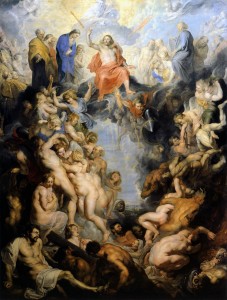depends entirely on the sanctity of our soul
We were created by God in the image of the Divine, indivisibly corporeal and spiritual creatures, tangible and intangible, material and immaterial, mortal and immortal. We do not have two natures but rather the union of our body and soul form a single nature: “Man, though made of body and soul, is a unity.” [Gaudium et Spes, 14] “The [Catholic] Church teaches that every spiritual soul is created immediately by God – it is not ‘produced’ by the parents – and also that it is immortal: it does not perish when it separates from the body at death, and it will be reunited with the body at the final Resurrection.” [CCC 366]

The Last Judgment – Rubens
God is the uncreated, infinite Creator of all creation; all of creation has been willed into being by God. God has no beginning but we do; we began when God willed our unity (body and soul) into existence. Death separates our immortal soul from our mortal body, at least temporarily, for they “will be reunited at the final Resurrection” at which time we will live forever either wrapped within or excluded from God’s presence. Whether we will spend eternity with God depends entirely on the sanctity of our soul at the end of our mortal life here on this earth.
To attain salvation, to be saved, our souls must be holy, filled with sanctifying grace and fully prepared for a supernatural life in perfect and absolute union with God. We are not born with soul sanctified and our concupiscence, that is our inclination to sin, can result in the loss of sanctification. To be sanctified, to fill our soul with holiness, we must first reconcile ourselves with God for all deadly or mortal sins.
While our soul will never cease to exist it can experience spiritual death and a soul that is spiritually dead cannot and will not see God. Through the mercy and grace of God we can respond to His gift of actual grace and regain the supernatural life of the soul through genuine and contrite reconciliation.
Another word for sanctification, which is often used by our Protestant brothers and sisters, is justification. St. Paul wrote “Do you not know that the unjust will not inherit the kingdom of God? … but now you have had yourselves washed, you were sanctified, you were justified in the name of the Lord Jesus Christ and in the Spirit of our God.” [1 Cor 9, 11] Protestants often claim that justification is a mere rhetorical device, a simple declaration by God that one is abruptly “justified.” Once you accept Jesus Christ as your personal Lord and Savior, you are now “justified.” Even though your soul remains unchanged, perhaps even spiritually dead, you have been saved and are on the expressway to heaven. You are still expected to seek sanctification, but whether you achieve any degree of holiness is irrelevant since you have been justified and have therefore been saved.
This is an unfortunate scam since it places God at the center of a lie: God says the sinner is justified when it really isn’t the case at all. Justification without sanctification is de facto impossible, no less so than God prevaricating. Sanctification is necessary for justification; without sanctification, justification is lost and the soul spiritually dead.
To be continued…
